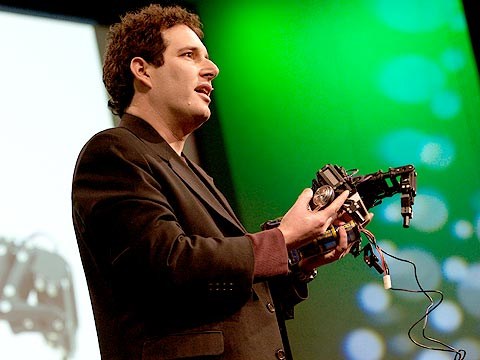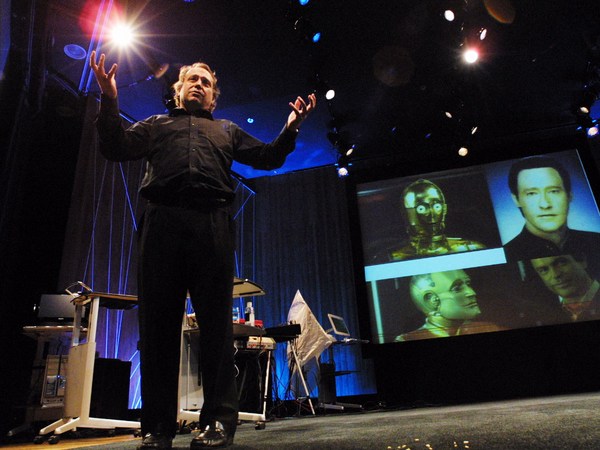Now, a few years back, I was having a barbecue with friends and family. As usual, we talked about the weather, the good food or TV shows to watch. So nothing out of the ordinary until one attendee casually mentioned that he and his wife hadn't had sex in a long time. As you can imagine, what followed was an awkward silence. Until a six-year-old boy attending the barbecue with his parents blurted out that his parents had lots of sex and he could hear them all the time. And then the barbecue continued as if nothing had happened.
Now, when I'm not having barbecues, I am researching how people interact with each other and how that transfers to their interactions with technologies, so not all too surprisingly, after this very unique social interaction at the barbecue, I was left wondering why we, the audience, were so greatly ignoring what the adult so openly shared with us that evening. So why the silence and then the laughter at the boy's comment? Well, both of them were breaking a social rule: never talk about sex, money or politics at a dinner table. We assume that an adult knows this rule and sticks to it. So when such expectations are broken, we sanction the offender accordingly -- in our case, with ignorance. When a child, however, breaks such a rule, we attribute this to their naive understanding of our social manners and up to a certain age at least, do not openly sanction them for it.
Clearly, there is no official rule book for socially appropriate behaviors or even socially accepted dinner topics. In fact, our social norms are usually unwritten codes of conduct, and they change over time as we as a society change and learn. Less than a year ago, for instance, it was considered impolite not to shake hands when introducing yourself to someone. A few months and the worldwide spread of the coronavirus later and shaking hands may be something to be frowned upon and maybe even a thing of the past.
The way we learn these social rules then is mostly by social rewards and social punishments. Now, as social animals, we aim for social approval and want to avoid other's disapproval. So we act in a way that is socially accepted and present ourselves in a socially desirable way to others. So we want to be seen as an individual that is smart, successful, sporty and active, creative, empathic and possibly all that at once. Now, through social media, our strive for social approval, and with it, our need for self-presentation and perfection has skyrocketed.
Clearly, there is a flip side to all of this. In any social interaction, we do not only look for others' approval, but we also constantly fear other's disapproval when we cannot live up to their expectations. Just consider an adult with incontinence problems or a drug addiction. If he or she had to talk to a health care professional, what would you expect to find? Or if a soldier returned from combat and had to talk about their fears or problems, do you think they would open up easily?
A team of USC researchers examined just that. So they looked at the data from the US Army. Traditionally, soldiers had to be interviewed by a human health care professional when returning from combat to check if everything is OK. Now, interestingly, the researchers found that soldiers hardly reported any problems after their returns. Surely many of them were truly fine, but the researchers also suspected that many soldiers did not dare to share their problems openly. After all, soldiers are trained to be strong and brave individuals that learn not to show any weaknesses. So openly admitting to have health problems, to have trouble sleeping or to have nightmares is not something easy to do for soldiers. The question then ultimately becomes how can we help individuals open up more easily and worry less about the judgment of others? Well, remember what I said earlier. We expect social evaluation in any social interaction. So how about we remove the social from the interaction? This is exactly what the team in the US did. In fact, they developed a virtual interviewer called SimSensei.
So SimSensei is a digital avatar that has a humanlike appearance and can interact with clients through natural conversations. Now, when returning from combat, soldiers were now interviewed by the digital avatar instead of that human health care professional. And what happened? Well, once SimSensei was introduced, soldiers reported more health problems, like having nightmares or trouble sleeping. So machines can help remove the social from the equation and help people open up more easily.
But careful, not all machines are created equal. Considering the tremendous advancements in technologies like computer graphics or natural language processing, machines have become increasingly humanlike. The question then ultimately becomes, which rules do we apply in these interactions? Do we still apply social rules when we interact with humanlike machines? So do we start to worry about social judgment again? This is exactly what I examine in my research.
Together with colleagues, we have developed a series of chatbots. These chatbots were programmed to simulate text-based conversations and they were designed to be either very social and humanlike or very functional and machine-like. So, for instance, our humanlike bots use so-called speed disfluencies and social language cues, like these "ohos", "ahas", "hmms" we humans love to use in our conversations to signal our presence to conversation partners. In contrast, our machine-like bots lacked such social cues and simply kept to the talking points. Since we were interested in how much people would open up in these different conversations, we ask participants a number of questions, which gradually grew more and more personal, up to the point where we would ask participants to share possibly very delicate information about themselves.
Now, considering the findings from prior research, such as the one from the US Army before, we expected that people would apply more social rules in their interactions with these humanlike bots and act accordingly. So what did we find? Well, exactly that. So participants interacting with our humanlike bots were more concerned about social evaluation and as a result of this social apprehension, they also gave more socially desirable responses.
Let me give you an example. One of the most delicate questions that we asked participants was the number of prior sex partners they had had. When interacting with our humanlike bot, men reported to have significantly more prior sex partners and women reported to have significantly less than those men and women interacting with our mechanistic bot. So what does this all tell us? Well, first, men want to look good by having more prior sex partners and women by having less. Clearly, this already says a lot about what the different sexes consider socially desirable and how our expectations in society still differ across genders. But this opens up a whole new topic that I will better leave for other experts to discuss.
Second, and maybe more importantly, from a consumer psychology perspective. People open up more easily when they interact with machines that are apparently just that -- machines. Today, a lot of sweat, money and tears is put into making machines basically indistinguishable from us. Now, this research can show that sometimes letting a machine be a machine is actually a good thing.
Which brings me to my third point. These machine interactions have been highly criticized at times. So you may have heard that Siri, Alexa or others make your kids rude or impolite. Hopefully, this research can show you a great upside of these machine interactions. In times of social media and our constant hunt for the next “like,” machines can give us grownups -- help us find that inner child again and give our constant need for self-presentation and perfection a time-out. For once, we do not need to worry if the number of prior sex partners is too high or too low, and instead it is OK to simply be who we are.
Ultimately, then, I think that these machines can remind us of a central element of what makes a good conversation partner: being nonjudgmental. so the next time you might encounter a unique social situation like mine at the barbecue, try to be less judgmental when another person openly shares their thoughts, feelings and problems with you. Many machines do this already, and maybe so should we.
Thank you very much.





